Beth and I and the rest of our team here at Hearts & Minds — Amy, Debi, Diana, and our little dog Rory — offer you greetings for a Merry Christmastime. We hope your Advent yearning has in some ways shifted to a celebration of the in-breaking of the Kingdom of God, discerned most clearly in the story of the incarnation. A pastor and author we admire, Rich Villados (author of Good and Beautiful and Kind), posted on Facebook some words of advice to preachers who were prepping before last Sunday’s services, and he said to just “trust the story.” Yes, yes, indeed. We hope you are learning with your families and faith communities to indwell this unfolding redemptive story where the long-awaited Baby King comes to heal the groanings of all creation. It’s a story of comfort and joy we hope you have found your own place in that story.
One of the ways we are reminded to do that — over and against the secularizing creep of the world’s pressures and its encroaching upon our imaginations — is to see our days and seasons in light of the big story told by the church calendar. One need not be in a highly liturgical church to have one’s sense of time shaped by the liturgical calendar, and there is (we are slowly finding) a unique benefit of spiritual formation when we pay less attention to the worldly and American celebrations and are instead more intentionally shaped by the church reminders over the course of a year of the life of Jesus. Sometimes these reminders are allusive and symbolic, which I think might be part of their normative power.
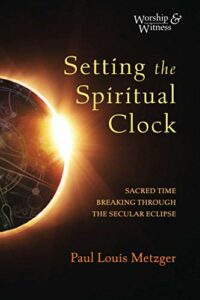 This was, in fact, why we hosted a webinar a month ago with my friend, the theological rock star, Paul Louis Metzger. We chatted for more than an hour about a book released not long ago done in association with the Calvin Institute of Christian Worship, a lovely study called Setting the Spiritual Clock: Sacred Time Breaking Through the Secular Eclipse (Cascade; $34.00; OUR SALE PRICE = $27.20.)
This was, in fact, why we hosted a webinar a month ago with my friend, the theological rock star, Paul Louis Metzger. We chatted for more than an hour about a book released not long ago done in association with the Calvin Institute of Christian Worship, a lovely study called Setting the Spiritual Clock: Sacred Time Breaking Through the Secular Eclipse (Cascade; $34.00; OUR SALE PRICE = $27.20.)
It is almost a daily devotional, written with thoughtful pieces to last a whole year, through and about the church seasons and we really, really appreciate it. It is a different book than his previous More Than Things: A Personalist Ethics for a Throwaway Culture (IVP Academic; $48.00.) IVP expertly hosted a free webinar with me and Paul discussing that book earlier in the year — you can check that out, HERE if you’d like. It was an impressive hour, believe me.
If More Than Things was a studious, deep bit of theological work on public life, social ethics, offering a Biblically-inspired vision of caring for people as people well (in contexts as diverse as disability studies, gender and sexuality, war, racism, medical ethics, and so forth) this Setting the Spiritual Clock one is easier to read, a guide full of Biblical reflections that help us focus on the highlights of the church year. (But the author’s wise, socially conscious worldview seeps through, offering more than an internal piety that doesn’t touch the real world or a fastidious traditionalism.) Starting in Advent, Metzger offers inspiring pieces that will surprise, delight, and challenge. On it goes through Christmastide and Epiphanytide into Holy Week, Eastertide, and Ordinary Time — with a couple of surprising devotionals on Memorial Day, the 4th of July, on Mothers and Fathers Day, Halloween, Earth Day and the like — this book promises to help us “reset” if we are “out of joint.” And who isn’t?
Setting the Spiritual Clock: Sacred Time Breaking Through the Secular Eclipse (Cascade; $34.00; OUR SALE PRICE = $27.20) invites us to and gives us tools to live into the story of God, to imagine time as sacred, to have the seasons and rhythms of God inform our days and lives. It’s almost 290 pages and one of the grandest devotionals you can get. It was an honor to talk with him about it at that webinar and it is our delight to share it with you here.
HERE is the free link to the on-line conversation we had about Setting the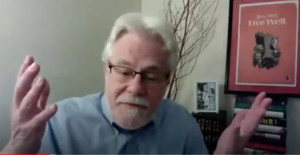 Spiritual Clock. It is about a book we truly value by an author whose friendship means much. It was a discussion about a book that we were honored to help promote and I wanted to suggest it even now as we are soon to turn our calendars ahead to a new year. We hope you enjoy the recording of the webinar. Part way through you’ll discover that there were provocative questions offered by online participants and we jive around all over, with Paul masterfully responding to all sorts of questions and comments. One or two
Spiritual Clock. It is about a book we truly value by an author whose friendship means much. It was a discussion about a book that we were honored to help promote and I wanted to suggest it even now as we are soon to turn our calendars ahead to a new year. We hope you enjoy the recording of the webinar. Part way through you’ll discover that there were provocative questions offered by online participants and we jive around all over, with Paul masterfully responding to all sorts of questions and comments. One or two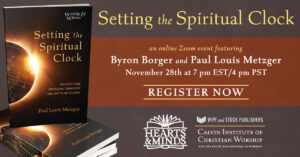 were a bit skeptical, one or two wondered how he might expand his insights about the rhythms and seasons built into the creation, and others wanted some practical help about how to get one’s spiritual formation practice more attuned to the liturgical seasons. Can this really help
were a bit skeptical, one or two wondered how he might expand his insights about the rhythms and seasons built into the creation, and others wanted some practical help about how to get one’s spiritual formation practice more attuned to the liturgical seasons. Can this really help  us as people? And what about church — what about worship styles and practices? As always, Paul invites us to read more and think together, to pray and seek God, to trust the Spirit. I think you’ll enjoy the chit chat and appreciate his warm and wise insight.
us as people? And what about church — what about worship styles and practices? As always, Paul invites us to read more and think together, to pray and seek God, to trust the Spirit. I think you’ll enjoy the chit chat and appreciate his warm and wise insight.
Dr. Paul Metzger is an excellent scholar (Professor of Theology & Culture at Multnomah University and Seminary and the Director of the Institute for Cultural Engagement: New Wine, New Wineskins) and yet is so personable and gracious and helpful. It’s a fun conversation. (Thanks to publisher Wipf & Stock for helping us pull it all off.) Again: here it is, the link to the webinar we held in late November. Enjoy.
7 MORE BOOKS TO HELP YOU THINK ABOUT TIME & THE CHURCH YEAR – all 20% off
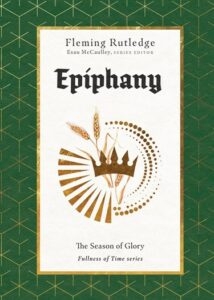 Epiphany: The Season of Glory Fleming Rutledge (IVP) $20.00 OUR SALE PRICE = $16.00
Epiphany: The Season of Glory Fleming Rutledge (IVP) $20.00 OUR SALE PRICE = $16.00
I really appreciate the “Fullness of Time” series edited by Esau McCaulley, including the most recent — and quite timely — Christmas: The Season of Life and Light by Emily Hunter McGowin. Here is what I wrote when I advertised it in an Advent BookNotes column more than a month ago:
Well, if Tish Warren’s warm but serious study of Advent in the Fullness of Time series made me cry and Emily Hunter McGowin’s remarkable study, Christmas, made me gape in wonder at the full 12 days, this brand new one by the great Fleming Rutledge is nothing short of spectacular. I was so very glad when I heard that she was invited to contribute to this series — how could she not be included! — and while she has the magisterial, definitive collection of sermons on Advent and Holy Week (in Advent and , respectively) she has not written much about Epiphany.
I have skimmed this already, not really wanting to study and underline and ponder its glory quite yet — it feels like cheating — but I can tell you that it is substantive, serious, excellently researched, loaded with Bible exploration and preacherly cadences. It is just over 160 pages (granted, the compact sized hardback isn’t huge) and she offers wisdom, insight, some rebuke, some warning, and lots of very good news. This little release is, in fact, a huge publishing event. I don’t know if it is Fleming’s last book but it is important and to be cherished.
In Epiphany: The Season of Glory, Rev. Fleming Rutledge shows how recovering a delight in the glory of God in Jesus Christ is ‘needed by the church right now as a drowning person needs a lifeboat.’ Written with joyful urgency yet patient wisdom, this book should be required reading for pastors seeking to recover the wonder of Epiphany. Veterans and newcomers to celebrating the liturgical year will find a treasure of biblical and theological insight in this succinct yet potent work. Moreover, anyone who aches for an alternative to the empty ‘glories’ so widely pursued today will be nourished by this exposition of the strange yet beautiful reality of God’s resplendent glory, displayed in the crucified Lord. — J. Todd Billings, professor of theology at Western Theological Seminary, author of The End of the Christian Life
With palpable reverence and predictable erudition, Fleming Rutledge unearths the riches of the most overlooked season of the liturgical year. Epiphany is all about glory, chiefly the glory of the person of Christ revealed in majesty and power as the King of the Jews and Lord of the Gentiles in key moments of the biblical drama. In Epiphany and the season leading up to Lent, the church gathers a fresh chance to behold the glory of her Lord and to renew itself in the work of proclaiming his glory to the world. — Katelyn Beaty, journalist, author of Celebrities for Jesus
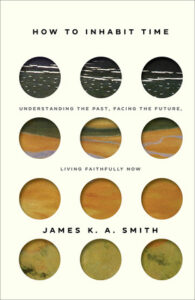 How to Inhabit Time: Understanding the Past, Facing the Future, Living Faithfully Now James K.A. Smith (Brazos Press) $24.99 OUR SALE PRICE = $19.99
How to Inhabit Time: Understanding the Past, Facing the Future, Living Faithfully Now James K.A. Smith (Brazos Press) $24.99 OUR SALE PRICE = $19.99
Those who follow BookNotes know I am a big fan of Jamie Smith. While a few of his books are very philosophically deep, and all are informed by his work as a Christian philosopher, many of his books are ideal for what we imagine as the thoughtful layperson. Not technically a scholar, but readers willing to spend the time to read substantive, important books. Smith can move from deep theological truths to contemporary culture in the blink of an eye and is one of the very best writers showing us how to “hold the Bible in one hand and the newspaper in the other,” as the saying goes. (And he’ll have a footnote saying who first said it, and another about a scholar who might warn us from misguided attempts.) I love him dearly and his book on time was a bit more elusive than some. It is a bit more demanding than You Are What You Love or even On the Road with Saint Augustine but it is not academic. One of the things that maybe made How to Inhabit Time a bit challenging is because, well, to be honest, as Metzger put it, there is this “secular creep.” We just find it hard to think about time, to imagine it, let alone to do so influenced by what Christian thinkers with Biblical wisdom have taught. Your typical pop-level book about Christian living just doesn’t touch this foundational stuff, even if it is the very air we breathe.
This offers sustained reflections on “the spiritual significance of time” starting with a riff on why many of us don’t even consider it. Like our “geography of nowhere” we are, too often, “nowhen” We are disconnected from the past and (at least some brands of Christianity) have us suppose that are above the fray, “above the flux of history” or immune to it. And get this, as it says on the back cover (and as he makes an remarkable case in several important chapters) our “lack of an awareness of time and the effects of history — both personal and collective — (cause us to be) native about current issues, prone to nostalgia, and fixated on end times.”
This question of how we think about time sounds a bit heady, sure. One of the blurbs on the back is by Sophfronia Scott, who is a student of the mystic Thomas Merton. Granted. But even the great Archbishop of Canterbury (The Most Rev. Justin Welby) — who knows a thing or two about the liturgical calendar, obviously — has said, simply, that “this book has helped me — genuinely.” If the distilled wisdom and applied cultural thinking has helped him “think about time in a fresh way” I am sure it can do the same for you.
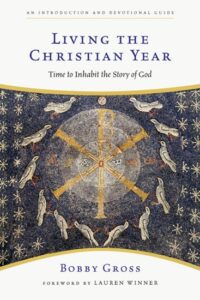 Living the Christian Year: Time to Inhabit the Story of God. Bobby Gross (IVP Formatio) $25.00 OUR SALE PRICE = $20.00
Living the Christian Year: Time to Inhabit the Story of God. Bobby Gross (IVP Formatio) $25.00 OUR SALE PRICE = $20.00
I have admired Bobby Gross for years and when he released this lovely daily devotional about the church year and sacred time, we wanted to host him here — our book party ended up being an Epiphany worship service. Ever since I’ve been very touched by certain devotional readings in this year-long collection and recommend it often. Usually, we display it whenever we set up a section at a book table that includes daily devotionals. But here, when pondering the influence of the “spiritual clock” and highlighted this webinar with Paul Metzger, I have to give it a renewed shout out. Bobby did not grow up in the liturgical church and so when he started attending a solid Episcopal church in New York (with his friend writer and poet and spiritual guide Madeleine L’Engle) he wanted to write a guide to this practice of keeping time in a way that those unfamiliar with the seasons would appreciate. Add to this one of the most influential essays I have ever read — the brief introduction by Lauren Winner — Living the Christian Year is a fine, conventional devo with 366 succinct daily readings, including a Bible text and a closing prayer. Highly recommended.
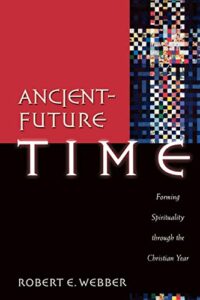 Ancient-Future Time: Forming Spirituality Through the Christian Year Robert Webber (Baker) $20.00 OUR SALE PRICE = $16.00
Ancient-Future Time: Forming Spirituality Through the Christian Year Robert Webber (Baker) $20.00 OUR SALE PRICE = $16.00
I could say much about the late, great Robert Webber, an liturgical evangelical who was raised in a low church, Baptist-like setting. He rose to prominence by writing several extraordinary books about Christian and culture (The Secular Saint and People of the Truth) but increasingly was drawn to writing about worship. He predicted in the 1970s (in Evangelicals on the Canterbury Trail) that more evangelicals would be drawn to liturgical churches and his work on worship — dozens of books both large and small — invited everyone to think harder about the form, content, and aesthetics of true worship. He began calling his project “ancient future” which had certain resonance with younger evangelicals and postmodern emergents. His Ancient Future Church was seminal and his Ancient Future Worship and Ancient Future Spirituality were excellent. This, then, Ancient Future Time, invited the newbies to more liturgical and artful forms of worship and prayer to consider the influence of the historic practices of the seasonal church calendar. For Bob, as he was called, it was more than simplistic rules about colors or holy days, but about how we construed time, our worldviews, our spiritual formation as Christians in the modern world. Metzger and Smith and Gross (above) all are quick to affirm that they are in his debt.
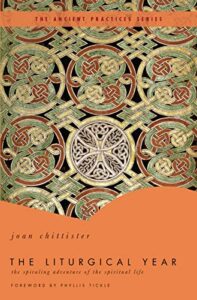 The Liturgical Year: The Spiraling Adventure of the Spiritual Life Joan Chittister (Thomas Nelson) $18.99 OUR SALE PRICE = $15.19
The Liturgical Year: The Spiraling Adventure of the Spiritual Life Joan Chittister (Thomas Nelson) $18.99 OUR SALE PRICE = $15.19
In the years before she died, the great literary, down-to-Earth spiritual writer (and advocate for healthy change within the book industry) Phyllis Tickle curated and edited a set of books called the “Ancient Faith” series. More could be said about each — they included titles like Sabbath by Dan Allender and Fasting by Scot McKnight and a beautiful one on fixed hour prayer by Robert Benson and more — but this one, on keeping the church calendar, was a highlight for many. Written by a progressive Catholic Benedictine nun (who has long been an active peacemaker and public justice leader), Sister Joan is beloved by many. About half of the book’s 30-some short chapters are about time, calendars, spiritual formation, following Jesus, worship, sabbath-keeping, feast days, and how the liturgical life “is not a relic from the past, but a resounding reality of life in the present lived out of an ancient but living faith.” She is wisely setting the stage for the second half which reflects on each of the seasons and times important in the cyclical church seasons. As Sister Joan puts it, “the liturgical year is an adventure in bringing the Christian life to fullness, the heart to alert, the soul to focus…it concerns itself with questions of how to make a life.”
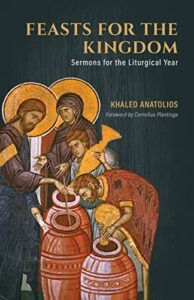 Feasts for the Kingdom: Sermons for the Liturgical Year Khaled Anatolios (Eerdmans) $19.99 OUR SALE PRICE = $15.99
Feasts for the Kingdom: Sermons for the Liturgical Year Khaled Anatolios (Eerdmans) $19.99 OUR SALE PRICE = $15.99
Who better than pastors and priests in the Byzantine Orthodox tradition to teach us how to understand the highlights of the church calendar? And what better way than to spend time reading sermons preached in keeping with the liturgical calendar, by an eloquent Orthodox preacher. These remarkable sermons are just that, messages offered in a real congregation (in a Melkite Greek Catholic Church, actually, a denomination that has its roots among Arabic-speaking Christians in the Middle East.) The messages are not generic, but specific, always based on the Bible, with a focus on Christ. Most sermons are about what their tradition calls Feast Days, which is to say, the celebrations of the seasons. They are made germane, even if deeply theological and festive, by being related to issues of the day. A few sermons are unique (one is an “election homily” entitled “Voting in Christ: Evangelical Counsel Before a Federal Election” and a few funeral and wedding homilies.
In a stirring forward, Reformed Protestant preacher Cornelius Plantinga notes that Father Anatolios trusts the text. He does not try to supply “his own juice” but trusts the power of the gospel. These messages are guided by their place in the liturgical seasons, but, finally, they are about the Kingdom of God, about salvation, about union with Christ in the struggle of daily discipleship. They will prepare your heart for feast days and other sorts of days as we grow into “resetting our spiritual clocks.”
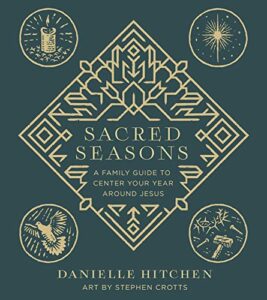 Sacred Seasons: A Family Guide to Center Your Year Around Jesus Danielle Hitchen with illustrations by Stephen Crotts (Harvest House) $29.99 OUR SALE PRICE = $23.99
Sacred Seasons: A Family Guide to Center Your Year Around Jesus Danielle Hitchen with illustrations by Stephen Crotts (Harvest House) $29.99 OUR SALE PRICE = $23.99
Here is what I wrote about this marvelous, handsome, big family devotional when we highlighted it at BookNotes a few weeks back:
Kudos to publisher Harvest House for doing a evangelically-rooted family prayer book that is attentive to the liturgical calendar. Some of you enjoyed that webinar we did with Paul Louis Metzger last week (around his book Setting Your Spiritual Clock ) and had I found time, I would have given this new resource a big shout-out. It is just slightly oversized, a nice hardback, with some handsome etchings and woodcuts in gold and red ink — it’s fabulous; very cool without being too glitzy.
UK Anglican poet Malcolm Guite has a great endorsement on the back (which is sort of rare) saying that Sacred Seasons is “a warm, winning, and above all practical introduction to the traditional church year.”
It is a handsomely designed book but it also has fun activities, delicious recipes, alongside the meaningful liturgies. It gently invites families into the ancient Christian disciplines of attending to the rhythms and cycles of the church calendar with a clear gospel focus on Jesus. Very nicely done.
+++
TO PLACE AN ORDER
PLEASE READ, THEN SCROLL DOWN AND CLICK ON THE “ORDER HERE” LINK BELOW.
It is helpful if you tell us how you want us to ship your orders.And if you are doing a pre-order, tell us if you want us to hold other books until the pre-order comes, or send some now, and others later… we’re eager to serve you in a way that you prefer. Let us know your hopes.
The weight and destination of your package varies but you can use this as a quick, general guide:
There are generally two kinds of US Mail options and, of course, UPS. If necessary, we can do overnight and other expedited methods, too. Just ask.
- United States Postal Service has the option called “Media Mail” which is cheapest but can be a little slower. For one typical book, usually, it’s $4.12; 2 lbs would be $4.87. This is the cheapest method available and seems not to be too delayed.
- United States Postal Service has another, quicker option called “Priority Mail” which is $8.50, if it fits in a flat-rate envelope. Many children’s books and some Bibles are oversized so that might take the next size up which is $9.20. “Priority Mail” gets much more attention than does “Media Mail” and is often just a few days to anywhere in the US.
- UPS Ground is reliable but varies by weight and distance and may take longer than USPS. Sometimes they are cheaper than Priority. We’re happy to figure out your options for you once we know what you want.
If you just want to say “cheapest” that is fine. If you are eager and don’t want the slowest method, do say so. It really helps us serve you well so let us know. Keep in mind the possibility of holiday supply chain issues and slower delivery… still, we’re excited to serve you. Blessed Advent.
BookNotes
SPECIAL
DISCOUNT
20% OFF
ALL BOOKS MENTIONED
+++
order here
this takes you to the secure Hearts & Minds order form page
just tell us what you want to order
inquire here
if you have questions or need more information
just ask us what you want to know
Hearts & Minds 234 East Main Street Dallastown PA 17313
read@heartsandmindsbooks.com
717-246-3333
Sadly, as of December 2023 we are still closed for in-store browsing. COVID is not fully over and is on the rise. Since few are reporting their illnesses anymore, it is tricky to know the reality but the best measurement is to check the waste water tables to see the amount of virus in the eco-system. It is bad and now getting worse. It’s important to be aware of how risks we take might effect the public good — those at risk, while not dying from the virus, are experiencing long-term health consequences. (Just check the latest reports of the rise of heart attacks and diabetes among younger adults, caused by Covid.) It is complicated, but we are still closed for in-store browsing due to our commitment to public health (and the safety of our family who live here, our staff, and customers.) Our store is a bit cramped without top-notch ventilation, so we are trying to be wise. Thanks for understanding.
We will keep you posted about our future plans… we are eager to reopen. Pray for us.
We are doing our curb-side and back yard customer service and can show any number of items to you if you call us from our back parking lot. It’s sort of fun, actually. We are eager to serve and grateful for your patience as we all work to mitigate the pandemic. We are very happy to help, so if you are in the area, do stop by. We love to see friends and customers.
We are happy to ship books anywhere.
We are here 10:00 – 6:00 EST / Monday – Saturday. Closed on Sunday.

